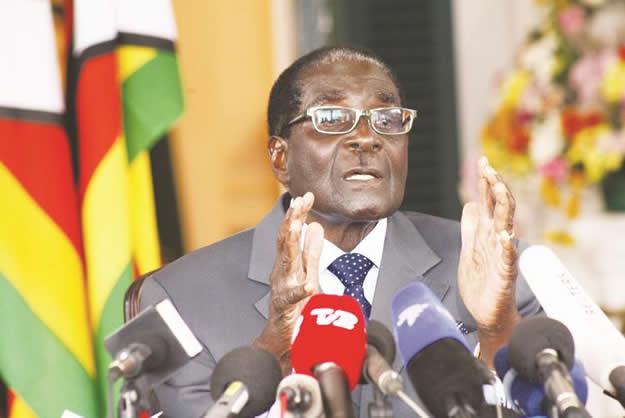President Mugabe is no political lightweight
Hildegarde The Arena
IT is one thing to dislike and/or disrespect President Robert Mugabe the man, but quite another to disrespect the Office of the President of Zimbabwe. Some ardent critics of President Mugabe fail to make that distinction, and in their mangled criticism of the President they also fail to realise that they are disrespecting all the offices that he represents, because they are offices that are instituted under the Constitution of Zimbabwe.
Agreed, a robust democracy should ensure that elements such as transparency, accountability and the freedom to question leaders’ actions are in place, but we question the motive when this so-called constructive criticism turns to misinformation and pure malice.
The most recent example is with regard to the appointment of Zimbabwe to the African Union’s first vice presidency, a situation that would see Zimbabwe and President Mugabe hosting and chairing the continental body’s 2015 Summit.
South Africa’s news24.com website and the Zimbabwe Mail of February 2 and February 10 respectively, published an article, “Mugabe’s AU post ‘insignificant’: Analysts”.
Insignificant is not a term of endearment. Dictionaries define it as too small or unimportant to be worth of consideration; unimportant; trivial; trifling negligible; inconsequential; of no account, and more.
Thus we question whether the writer wanted to create an impression that just because Zimbabwe landed the first vice chair post and President Mugabe in particular, the position was thus not significant.
Did it become inconsequential just because The Herald celebrated the election and also educated readers about its implication?
Whatever their reason, they did not just disrespect the Office of the President of Zimbabwe, but they also failed to respect the continental body and its institutions for this was an election that was transparently carried out at the AU Summit in Addis Ababa.
The position cannot become less powerful or “insignificant” just because it is held by President Mugabe. If the vice chairperson position is insignificant, so too all the structures and institutions of the continental bloc.
The election of President Mugabe was as binding as that of other office bearers, including current chairperson President Mohamed Ould Abdel Aziz of Mauritania because the African Union Assembly is composed of Heads of State and Government or their duly accredited representatives and they are the Union’s supreme organ.
The articles in both sources said: “Zimbabwean President Robert Mugabe’s recent election to a top African Union position should not be seen as significant, the Institute of Security Studies has said, quashing reports that the veteran leader’s appointment could give him some form of credibility”.
Jakkie Cilliers said: “It’s wrong to see Zimbabwe’s election to the bureau as significant. The positions on the bureau are rotational and it was Zimbabwe’s turn.”
Cilliers’ argument is that just because the position is rotational, therefore it is not significant. With the exception of the Secretariat, which position is not rotational? It would mean that Mauritania’s position is also insignificant.
Cilliers further claims that President Mugabe could never be considered the future of the continent, but “rather part of a diminishing number of Africa’s autocrats’”.
He also claims that President Mugabe’s election “was one of ‘principle’” rather than support for Zimbabwe or Mugabe. But, he does not give official voice from the AU itself to support that the election was just a matter of principle.
The heading of the article implies that these were views from “analysts”, but when you go through the piece, there is only one analyst from one organization – Jakkie Cilliers, executive director of the Institute for Security Studies in South Africa.
Cilliers has always had interest in Zimbabwean affairs and President Mugabe in particular. The most recent article he wrote on Zimbabwe was “Zimbabwe: What do elections in Zimbabwe really mean?” which was published on August 2, 2013. He wrote in part: “More than three decades of rule by President Robert Mugabe, recently as part of an uneasy alliance with the Movement for Democratic Change (MDC), have reduced the income per person in Zimbabwe to levels equivalent to that in Somalia, slightly better than in the Democratic Republic of Congo (DRC) and roughly comparable to that in Burundi . . . Looking forward, the eventual transition from authoritarian leadership to accountability will inevitably be accompanied by considerable instability, particularly given the partisan nature of the security agencies and the extent to which Zimbabwe’s institutions, including the courts, media and civil society, have been weakened . . .
“Yet Zimbabwe continues to be important for Sadc because it has become an ‘empty space’ in the centre of the region, hampering regional integration in practical and political terms. Practically because its poor infrastructure cannot facilitate regional trade and politically because of the associated impasse within Sadc, an organisation that has much potential but remains hamstrung by the regional differences among its members and their subsequent lack of commitment to regional economic integration…”
There are also a number of inconsistencies in the story. It says “Mugabe was appointed first deputy chair of the AU executive council, a title for a potentially high profile job”. How then does an insignificant position open opportunities for a “potentially high profile job”?
You also wonder which planet Cilliers comes from. For the second time, the AU indicated to the EU that if President Mugabe was not invited to the AU-EU meeting in April, then the meeting will be a no-show. This is how insignificant President Mugabe and Zimbabwe are to the AU governance systems.
There might not be a relation, but has Africa and those opposed to President Mugabe ever wondered how this rotation could happen in such a manner? In 2013, while some were ranting and raving about the July 31 poll, Sadc elected him and Zimbabwe deputy chair, meaning that he will take over the chairmanship of Sadc at the 2014 summit.
History also tells us that it was Zimbabwe that provided the first Executive Secretary of Sadcc, the predecessor of Sadc.
“Insignificant” though he might be, he is probably one of the few people who was present when the Organisation of African Unity was formed on June 25, 1963.
He was there as an observer. He has witnessed the changes from OAU to the African Union. When Zimbabwe takes over the chair next year, we will not be wondering about whether President Mugabe has what it takes to chair the continental body from 2015 to 2016 because the AU Assembly believed he is capable, and they elected him, whether on a rotational or non-rotational basis.
These insignificant others will just have to wait for that moment, for January 2015 is a year away.
You also realise that this is not just another anti-Mugabe jibe, but a plea to Africa to remember that after all it was Europe that started business with them and not China.









Comments